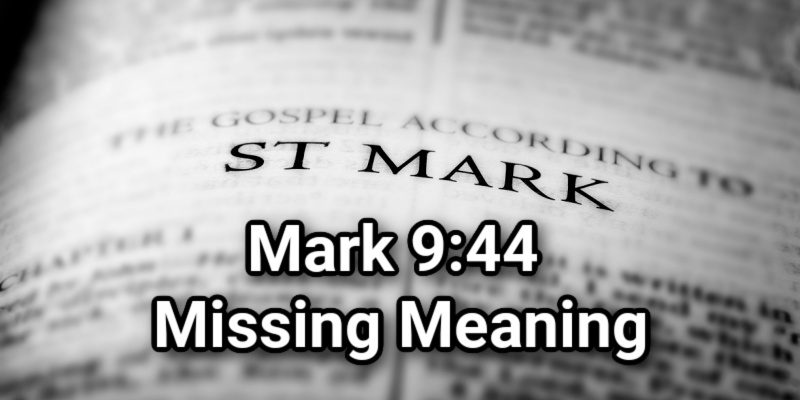Lord’s Library editors offer a Mark 9:44 meaning with commentary on why the verse is missing from new Bible versions, for your edification.
 When trying to understand the meaning of Mark 9:44 and see why it’s missing in modern versions, first see the verse: “Where their worm dieth not, and the fire is not quenched.” It is a verse that speaks with terrifying clarity about the eternality of hell. It’s part of Jesus’ chilling warning in Mark 9, where He urges readers to cut off whatever causes them to sin rather than be cast into hell—into “the fire that never shall be quenched.”
When trying to understand the meaning of Mark 9:44 and see why it’s missing in modern versions, first see the verse: “Where their worm dieth not, and the fire is not quenched.” It is a verse that speaks with terrifying clarity about the eternality of hell. It’s part of Jesus’ chilling warning in Mark 9, where He urges readers to cut off whatever causes them to sin rather than be cast into hell—into “the fire that never shall be quenched.”
In the King James Bible, this phrase appears three times: in verses 44, 46, and 48, giving repetition and thus weight to the message:
- Mark 9:44: “Where their worm dieth not, and the fire is not quenched.”
- Mark 9:46: “Where their worm dieth not, and the fire is not quenched.”
- Mark 9:48: “Where their worm dieth not, and the fire is not quenched.”
Yet in nearly all modern Bible versions—including the ESV, NIV, NASB—Mark 9:44 and 9:46 are removed entirely, with only verse 48 retained. The result is a watered-down passage that removes God’s ordained repetition and softens the force of Christ’s Words.
Mark 9:44 Missing Meaning
The repeated phrase in Mark 9—“Where their worm dieth not, and the fire is not quenched”—comes directly from Isaiah 66:24, which describes the fate of the wicked in eternal terms. Jesus is not just borrowing Old Testament imagery here—He is affirming the doctrine of eternal torment, warning in no uncertain terms that hell is not metaphorical. The worm represents never-ending corruption, and the unquenched fire represents God’s just but unrelenting judgment.
By repeating this phrase three times in the King James Bible, Jesus is sounding a spiritual alarm that no one should be able to overlook. But in the modern versions, two of the three warnings are missing. These manuscripts are treated as “earliest and best,” but that assumption is based more on academic tradition than on spiritual discernment. Older does not mean purer, especially when the fruit of these manuscripts offers doctrinal erosion.
The critical text removes Mark 9:44 and 9:46, reducing Jesus’ triple warning to a single reference in verse 48. But that approach runs counter to the very way God often communicates in Scripture. When God repeats Himself, it is to emphasize something of eternal importance. The King James Bible preserves all three occurrences because it follows the vast majority of Greek manuscripts, which include these verses.
It is our opinion that every time the lake of fire is downplayed, every time eternal judgment is softened, every time a passage about hell is diluted, Satan rejoices. Because what better way to keep people asleep than to hush the alarms God Himself has sounded?
The repeated removal of hellfire warnings in modern Bibles exchanges conviction for comfort, reverence for readability, and God’s authority for academic consensus. Mark 9:44 is not redundant, it is Jesus Christ Himself warning sinners—three times—of the eternal consequences of sin. To remove His words is to dull the sword of the Spirit and leave souls defenseless as a result.
The King James Bible stands alone among English versions today in its full preservation of this passage. It does not apologize for Jesus’ message. It does not clip His warnings to fit the modern tone. Hell hasn’t disappeared just because the verses have changed. Judgment is still coming, and Jesus still says: “Where their worm dieth not, and the fire is not quenched.” Amen!
Lord's Library is a Christian resource hub. Our editors use a variety of internet research methods like search engines, audio and video, AI, consultations with ministry leaders in the field, and more. Lord's Library should never be a substitute for reading your Bible daily as the Scriptures are to be our final authority on all matters. Lord's Library participates in affiliate programs. We may make a small commission from products purchased through this resource.
- Mark 7:16 Meaning: Why is it Missing in Modern Bibles? - June 5, 2025
- What Does the Bible Say about Habits? With Key Scriptures - May 25, 2025
- What Does the Bible Say about Grief? With Key Scriptures - May 24, 2025















